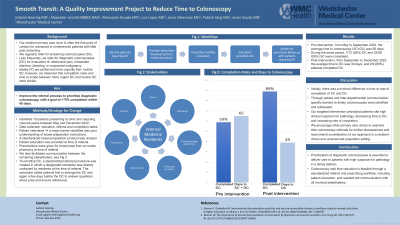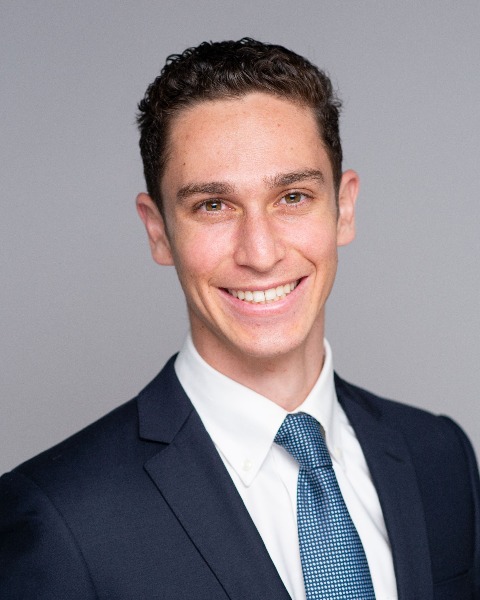Sunday Poster Session
Category: Practice Management
P1226 - Smooth Transit: A Quality Improvement Project to Reduce Time to Colonoscopy
Sunday, October 22, 2023
3:30 PM - 7:00 PM PT
Location: Exhibit Hall

Has Audio

Gabriel Heering, MD
Westchester Medical Center
New York, NY
Presenting Author(s)
Gabriel Heering, MD, Alexander Levstik, MD, Menasche Krupka, MD, Luis Lopez, MD, Jesse Silverman, MD, Patrick Yang, MD, Jason Goutis, MD
Westchester Medical Center, Valhalla, NY
Introduction: Our resident primary care clinic (RPCC) often serves as the first point of contact for uninsured or underserved patients with little past screening. Thus, we regularly refer for screening colonoscopies (SC). Less frequently, we refer for diagnostic colonoscopies (DC) to evaluate abdominal pain, intractable diarrhea, bleeding, or suspected malignancy. However, we observed that completion rates and time to scope between more urgent DC and routine SC were similar. Our quality improvement (QI) project aimed to improve the referral process to prioritize DC, with a goal of >75% completion within 45 days.
Methods: We identified 79 patients aged 31-78 presenting to the RPCC and requiring colonoscopies between May and December 2022. Data collection included indication for colonoscopy, as well as referral and completion dates. Patient interviews were conducted. A major barrier identified was poor understanding of bowel preparation instructions. A standardized bowel preparation protocol was created, patient education was provided at time of referral, and prescriptions were given for bowel prep from an onsite pharmacy at time of referral. We also facilitated communication between the remaining stakeholders: RPCC, gastroenterology department, schedulers, nurses, social workers. To prioritize DC, a standardized referral procedure was created in which a designated scheduler was directly contacted by residents at the time of referral. The scheduler called patients first to arrange the DC and again a few days before the DC to answer questions about prep and ensure adherence.
Results: Pre-intervention, from May to September 2022, the average time to colonoscopy was 65 days; and 32/58 (55%) patients received SC. During the same period, 7/12 (59%) DC were completed. Post-intervention, from September to December 2022, the average time to DC was 35 days; and 8/9 (89%) patients completed DC.
Discussion: Initially, there was a minimal difference in time or rate of completion of SC and DC. Through patient and inter-departmental communication, specific barriers to timely colonoscopies were identified and addressed. Our targeted intervention prioritized patients with high clinical suspicion for pathology, decreasing time to DC and increasing rate of completion. We encourage other primary care clinics to examine their colonoscopy referrals for similar discrepancies and recommend consideration of our approach in a resident-driven and underserved population setting.
Disclosures:
Gabriel Heering, MD, Alexander Levstik, MD, Menasche Krupka, MD, Luis Lopez, MD, Jesse Silverman, MD, Patrick Yang, MD, Jason Goutis, MD. P1226 - Smooth Transit: A Quality Improvement Project to Reduce Time to Colonoscopy, ACG 2023 Annual Scientific Meeting Abstracts. Vancouver, BC, Canada: American College of Gastroenterology.
Westchester Medical Center, Valhalla, NY
Introduction: Our resident primary care clinic (RPCC) often serves as the first point of contact for uninsured or underserved patients with little past screening. Thus, we regularly refer for screening colonoscopies (SC). Less frequently, we refer for diagnostic colonoscopies (DC) to evaluate abdominal pain, intractable diarrhea, bleeding, or suspected malignancy. However, we observed that completion rates and time to scope between more urgent DC and routine SC were similar. Our quality improvement (QI) project aimed to improve the referral process to prioritize DC, with a goal of >75% completion within 45 days.
Methods: We identified 79 patients aged 31-78 presenting to the RPCC and requiring colonoscopies between May and December 2022. Data collection included indication for colonoscopy, as well as referral and completion dates. Patient interviews were conducted. A major barrier identified was poor understanding of bowel preparation instructions. A standardized bowel preparation protocol was created, patient education was provided at time of referral, and prescriptions were given for bowel prep from an onsite pharmacy at time of referral. We also facilitated communication between the remaining stakeholders: RPCC, gastroenterology department, schedulers, nurses, social workers. To prioritize DC, a standardized referral procedure was created in which a designated scheduler was directly contacted by residents at the time of referral. The scheduler called patients first to arrange the DC and again a few days before the DC to answer questions about prep and ensure adherence.
Results: Pre-intervention, from May to September 2022, the average time to colonoscopy was 65 days; and 32/58 (55%) patients received SC. During the same period, 7/12 (59%) DC were completed. Post-intervention, from September to December 2022, the average time to DC was 35 days; and 8/9 (89%) patients completed DC.
Discussion: Initially, there was a minimal difference in time or rate of completion of SC and DC. Through patient and inter-departmental communication, specific barriers to timely colonoscopies were identified and addressed. Our targeted intervention prioritized patients with high clinical suspicion for pathology, decreasing time to DC and increasing rate of completion. We encourage other primary care clinics to examine their colonoscopy referrals for similar discrepancies and recommend consideration of our approach in a resident-driven and underserved population setting.
Disclosures:
Gabriel Heering indicated no relevant financial relationships.
Alexander Levstik indicated no relevant financial relationships.
Menasche Krupka indicated no relevant financial relationships.
Luis Lopez indicated no relevant financial relationships.
Jesse Silverman indicated no relevant financial relationships.
Patrick Yang indicated no relevant financial relationships.
Jason Goutis indicated no relevant financial relationships.
Gabriel Heering, MD, Alexander Levstik, MD, Menasche Krupka, MD, Luis Lopez, MD, Jesse Silverman, MD, Patrick Yang, MD, Jason Goutis, MD. P1226 - Smooth Transit: A Quality Improvement Project to Reduce Time to Colonoscopy, ACG 2023 Annual Scientific Meeting Abstracts. Vancouver, BC, Canada: American College of Gastroenterology.
